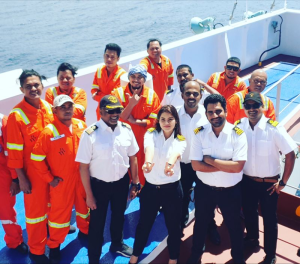India, with its extensive coastline of over 7,500 kilometers and a rich maritime heritage, has always played a pivotal role in global maritime activities. As the world continues to rely heavily on maritime trade and transportation, India is increasingly focusing on developing robust maritime and marine education systems to prepare the next generation of skilled mariners who can navigate the complexities of modern shipping and contribute to the global maritime industry.
The Importance of Maritime Education in India
Maritime education is crucial for a nation like India, which is strategically located along major international shipping routes. The country’s economic growth is closely tied to its maritime sector, with approximately 95% of its trade by volume being conducted via sea routes. As global trade continues to expand, there is a growing demand for well-trained maritime professionals who can ensure the smooth and safe operation of ships, ports, and related infrastructure.
India has a long-standing tradition of producing competent seafarers who are known for their discipline, technical expertise, and adaptability. However, the rapidly evolving nature of the maritime industry, driven by technological advancements and stringent international regulations, necessitates continuous upgrades in the educational framework to equip future mariners with the skills needed to thrive in this dynamic environment.

Credit:https://www.merchantnavydecoded.com/mui-nusi/
Key Institutions and Educational Pathways
India boasts several premier institutions that offer specialized maritime and marine education, each playing a crucial role in shaping the careers of aspiring mariners. Some of the notable institutions include:
- Indian Maritime University (IMU): Established in 2008, IMU is the central university that governs maritime education in India. With campuses spread across Chennai, Mumbai, Kolkata, Visakhapatnam, and Cochin, IMU offers a wide range of undergraduate, postgraduate, and doctoral programs in marine engineering, nautical science, shipbuilding, port management, and more. IMU is at the forefront of integrating modern educational practices with traditional maritime training, ensuring that students are well-prepared for both on-shore and off-shore roles.
- Tolani Maritime Institute (TMI): Located in Pune, TMI is one of the leading private maritime institutes in India. It offers degree programs in Marine Engineering and Nautical Technology, along with various short-term courses that cater to the specific needs of the maritime industry. TMI is known for its state-of-the-art facilities, including advanced simulators and training ships, which provide hands-on experience to students.
- Marine Engineering and Research Institute (MERI): With campuses in Kolkata and Mumbai, MERI is one of the oldest and most prestigious maritime training institutions in India. It offers a range of courses in marine engineering, ship design, and offshore engineering, and has produced some of the finest mariners and engineers who have gone on to serve in leading shipping companies worldwide.
- National Institute of Ocean Technology (NIOT): NIOT, located in Chennai, focuses on ocean engineering, marine robotics, and deep-sea exploration. It plays a significant role in fostering research and innovation in the marine sector, providing students with opportunities to work on cutting-edge projects that have both national and global significance.
Challenges and Opportunities
While India’s maritime education sector is well-established, it faces several challenges that need to be addressed to maintain its competitive edge in the global market. One of the primary challenges is keeping up with the rapid technological changes in the maritime industry, such as the increasing use of automation, artificial intelligence, and sustainable practices in shipping.
Another challenge is the need for greater industry-academia collaboration. To ensure that the curriculum remains relevant and up-to-date, educational institutions must work closely with shipping companies, port authorities, and maritime organizations. This collaboration can also facilitate internships, training programs, and job placements for students, providing them with real-world experience that complements their academic learning.
Despite these challenges, the future of maritime education in India looks promising. The Indian government, along with private players, is investing heavily in upgrading infrastructure, enhancing faculty training, and fostering research and development in the maritime sector. Initiatives like the Sagarmala project, aimed at modernizing ports and developing coastal areas, further underscore the importance of maritime education in driving the country’s economic growth.
Conclusion
Maritime and marine education in India is at a critical juncture, poised to equip the next generation of mariners with the skills and knowledge needed to excel in a rapidly changing industry. With its strong educational foundation, strategic investments, and a commitment to innovation, India is well-positioned to continue its legacy as a global leader in the maritime sector, contributing not only to its own economic prosperity but also to the safety, efficiency, and sustainability of global maritime trade.
As India navigates the future, its maritime educational institutions will play a key role in steering the nation towards greater maritime excellence, ensuring that Indian mariners remain at the helm of global shipping for years to come.


I have read a few good stuff here. Certainly value bookmarking for revisiting. I surprise how much effort you put to make one of these wonderful informative website.
This is my first time pay a visit at here and i am actually happy to read everthing at single place.
This is my first time go to see at here and i am actually impressed to read all at alone place.
I know this website gives quality depending posts and additional
stuff, is there any other site which gives these information in quality?
Hello, I log on to your blog regularly. Your story-telling style is awesome, keep up the good work!